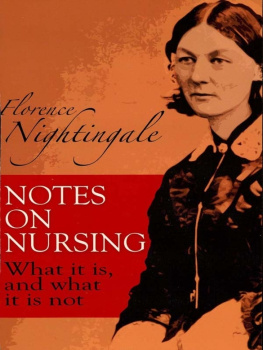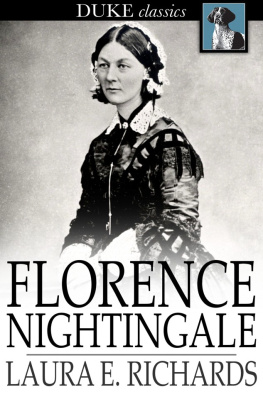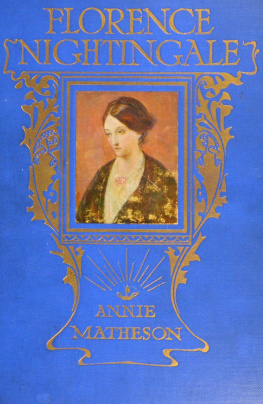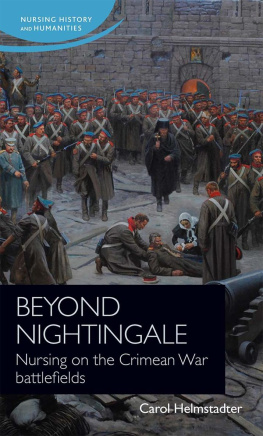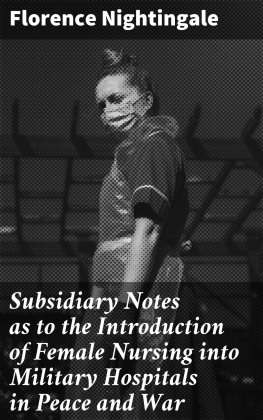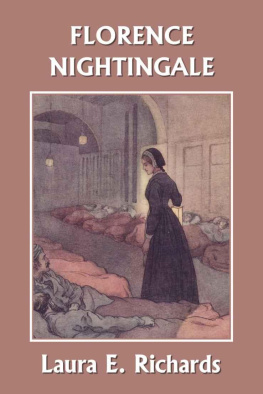Nightingale - Notes on Nursing
Here you can read online Nightingale - Notes on Nursing full text of the book (entire story) in english for free. Download pdf and epub, get meaning, cover and reviews about this ebook. year: 2012;2004, publisher: Dover Publications, genre: Romance novel. Description of the work, (preface) as well as reviews are available. Best literature library LitArk.com created for fans of good reading and offers a wide selection of genres:
Romance novel
Science fiction
Adventure
Detective
Science
History
Home and family
Prose
Art
Politics
Computer
Non-fiction
Religion
Business
Children
Humor
Choose a favorite category and find really read worthwhile books. Enjoy immersion in the world of imagination, feel the emotions of the characters or learn something new for yourself, make an fascinating discovery.
- Book:Notes on Nursing
- Author:
- Publisher:Dover Publications
- Genre:
- Year:2012;2004
- Rating:4 / 5
- Favourites:Add to favourites
- Your mark:
- 80
- 1
- 2
- 3
- 4
- 5
Notes on Nursing: summary, description and annotation
We offer to read an annotation, description, summary or preface (depends on what the author of the book "Notes on Nursing" wrote himself). If you haven't found the necessary information about the book — write in the comments, we will try to find it.
Notes on Nursing — read online for free the complete book (whole text) full work
Below is the text of the book, divided by pages. System saving the place of the last page read, allows you to conveniently read the book "Notes on Nursing" online for free, without having to search again every time where you left off. Put a bookmark, and you can go to the page where you finished reading at any time.
Font size:
Interval:
Bookmark:
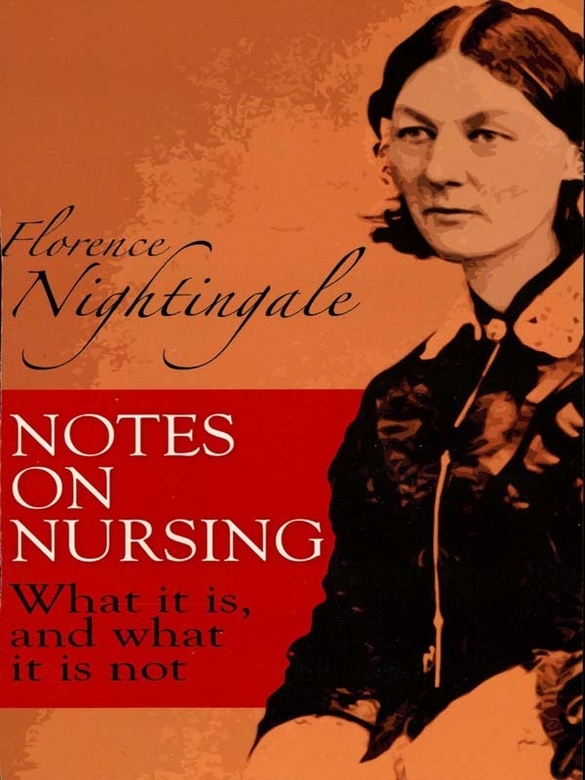
TABLE A.
GREAT BRITAIN
AGES

TABLE B.
AGED 20 YEARS, AND UPWARDS.

25,466 were returned, at the census of 1851, as nurses by profession, 39,139 nurses in domestic service, and 2,822 midwives. The numbers of different ages are shown in table A, and in table B their distribution over Great Britain.
To increase the efficiency of this class, and to make as many of them as possible the disciples of the true doctrines of health, would be a great national work.
For there the material exists, and will be used for nursing, whether the real conclusion of the matter be to nurse or to poison the sick. A man, who stands perhaps at the head of our medical profession, once said to me, I send a nurse into a private family to nurse the sick, but I know that it is only to do them harm.
Now a nurse means any person in charge of the personal health of another. And, in the preceding notes, the term nurse is used indiscriminately for amateur and professional nurses. For, besides nurses of the sick and nurses of children, the numbers of whom are here given, there are friends or relations who take temporary charge of a sick person, there are mothers of families. It appears as if these unprofessional nurses were just as much in want of knowledge of the laws of health as professional ones.
Then there are the schoolmistresses of all national and other schools throughout the kingdom. How many of childrens epidemics originate in these! Then the proportion of girls in these schools, who become mothers or members among the 64,600 nurses recorded above, or schoolmistresses in their turn. If the laws of health, as far as regards fresh air, cleanliness, light, &c., were taught to these, would this not prevent some children being killed, some evil being perpetuated? On women we must depend, first and last, for personal and household hygienefor preventing the race from degenerating in as far as these things are concerned. Would not the true way of infusing the art of preserving its own health into the human race be to teach the female part of it in schools and hospitals, both by practical teaching and by simple experiments, in as far as these illustrate what may be called the theory of it?
Sanitary nursing as essential in surgical as in medical cases, but not to supersede surgical nursing.
The whole of the preceding remarks apply even more to children and to puerperal woman than to patients in general. They also apply to the nursing of surgical, quite as much as to that of medical cases. Indeed, if it be possible, cases of external injury require such care even more than sick. In surgical wards, one duty of every nurse certainly is prevention. Fever, or hospital gangrene, or pymia, or purulent discharge of some kind may else supervene. Has she a case of compound fracture, of amputation, or of erysipelas, it may depend very much on how she looks upon the things enumerated in these notes, whether one or other of these hospital diseases attacks her patient or not. If she allows her ward to become filled with the peculiar close foetid smell, so apt to be produced among surgical cases, especially where there is great suppuration and discharge, she may see a vigorous patient in the prime of life gradually sink and die where, according to all human probability, he ought to have recovered. The surgical nurse must be ever on the watch, ever on her guard, against want of cleanliness, foul air, want of light, and of warmth.
Nevertheless let no one think that because sanitary nursing is the subject of these notes, therefore, what may be called the handicraft of nursing is to be undervalued. A patient may be left to bleed to death in a sanitary palace. Another who cannot move himself may die of bed-sores, because the nurse does not know how to change and clean him, while he has every requisite of air, light, and quiet. But nursing, as a handicraft, has not been treated of here for three reasons: 1. That these notes do not pretend to be a manual for nursing, any more than for cooking for the sick; 2. That the writer, who has herself seen more of what may be called surgical nursing, i.e. practical manual nursing, than, perhaps, any one in Europe, honestly believes that it is impossible to learn it from any book, and that it can only be thoroughly learnt in the wards of a hospital; and she also honestly believes that the perfection of surgical nursing may be seen practised by the old-fashioned Sister of a London hospital, as it can be seen nowhere else in Europe. 3. While thousands die of foul air, &c., who have this surgical nursing to perfection, the converse is comparatively rare.
Children: their greater susceptibility to the same things.
To revert to children. They are much more susceptible than grown people to all noxious influences. They are affected by the same things, but much more quickly and seriously, viz., by want of fresh air, of proper warmth, want of cleanliness in house, clothes, bedding, or body, by startling noises, improper food, or want of punctuality, by dulness and by want of light, by too much or too little covering in bed, or when up, by want of the spirit of management generally in those in charge of them. One can, therefore, only press the importance, as being yet greater in the case of children, greatest in the case of sick children, of attending to these things.
That which, however, above all, is known to injure children seriously is foul air, and most seriously at night. Keeping the rooms where they sleep tight shut up, is destruction to them. And, if the childs breathing be disordered by disease, a few hours only of such foul air may endanger its life, even where no inconvenience is felt by grown-up persons in the same room.
The following passages, taken out of an excellent Lecture on Sudden Death in Infancy and Childhood, just published, show the vital importance of careful nursing of children. In the great majority of instances, when death suddenly befalls the infant or young child, it is an accident; it is not a necessary result of any disease from which it is suffering.
It may be here added, that it would be very desirable to know how often death is, with adults, not a necessary, inevitable result of any disease. Omit the word sudden; (for sudden death is comparatively rare in middle age;) and the sentence is almost equally true for all ages.
The following causes of accidental death in sick children are enumerated : Sudden noises, which startle a rapid change of temperature, which chills the surface, though only for a momenta rude awakening from sleep or even an over-hasty, or an overfull mealany sudden impression on the nervous systemany hasty alteration of posturein short, any cause whatever by which the respiratory process may be disturbed.
It may again be added, that, with very weak adult patients, these causes are also (not often suddenly fatal, it is true, but) very much oftener than is at all generally known, irreparable in their consequences.
Both for children and for adults, both for sick and for well (although more certainly in the case of sick children than in any others), I would here again repeat, the most frequent and most fatal cause of all is sleeping, for even a few hours, much more for weeks and months, in foul air, a condition which, more than any other condition, disturbs the respiratory process, and tends to produce accidental death in disease.
Font size:
Interval:
Bookmark:
Similar books «Notes on Nursing»
Look at similar books to Notes on Nursing. We have selected literature similar in name and meaning in the hope of providing readers with more options to find new, interesting, not yet read works.
Discussion, reviews of the book Notes on Nursing and just readers' own opinions. Leave your comments, write what you think about the work, its meaning or the main characters. Specify what exactly you liked and what you didn't like, and why you think so.

